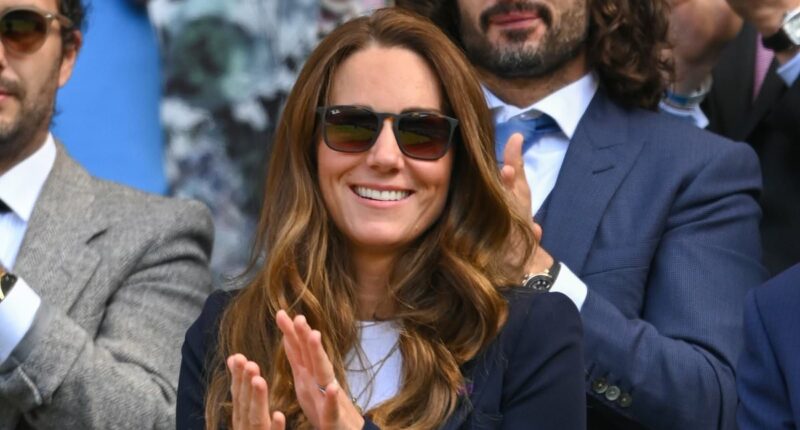Share this @internewscast.com
Fear stalks the luxury goods industry which brings us brandy, champagne, baubles, £10,000 handbags and £150,000 watches – not to mention £520 bucket hats for this summer’s 1990s style revival, sparked by the Oasis concerts.
Shares in industry behemoth LVMH are down by more than 30 per cent over the past 12 months to €472 (£409) as a result of a slump in demand and factors such as the availability of ‘super-fake’ bags – that can only be distinguished from the real thing by X-ray technology.
In April 2023 shares in LVMH, which owns Dior, Louis Vuitton, Moet Hennessy, Sephora, Tiffany, Tag Heuer and 69 other brands, reached €903 (£783). LVMH boss Bernard Arnault became the world’s richest man; he’s now number eight in the league.
A fightback is currently being led by LVMH and the other names in this €364billion (£316billion) industry of gloss and glamour – Burberry, EssilorLuxottica, Hermes, Kering and Richemont – hinting that it may be time to start bargain shopping for luxury goods shares.
But the performance of an Asian newcomer suggests that these European players will have to muster all their creativity to regain their lustre.
Over the past year, there has been a 928 per cent leap in the shares of Laopu Gold, a Chinese group founded in 2009.

Deluxe: The Princess of Wales sports Ray-Bans, a Cartier watch, a Birkin bag and a bottle of Moet
The company’s jewellery and watches embody ‘guochao’ – that is, heritage, a quality currently most appealing to Chinese consumers.
Since China is the world’s largest luxury goods market, this homegrown bling movement is more bad news for LVMH and the rest.
It also indicates what Gillian Diesen of Pictet Asset Management calls a shift to ‘hard luxury’ that is more about lasting quality. Laopu pieces are made of 24-carat gold, a plus when the gold price is forecast to rise further.
LVMH and the other European players have already lost about 50m customers worldwide in the past two years as post-pandemic ‘revenge spending’ has receded against a tough macro-economic background.
Tariffs may exacerbate the situation in the US. In the worst-case scenario, management consultants Bain estimates that the sector could shrink by a further 5 to 9 per cent this year.
The companies’ forthcoming second-quarter results will underline the headwinds they face.
But Diesen argues that this will draw attention to luxury goods shares. Investors looking to diversify will conclude that the valuation of some companies is ‘untenably low’.
Diesen says: ‘Despite low short-term expectations, there is little reason to suggest that premium brand spending will not return to its normal long-term average levels of growth, even in China.
‘These companies have high gross profit margins, strong balance sheets, plenty of pricing power and long heritage which should see them through more volatile times.’
The allure of a £10,000 bag may be lost on you, but you are gambling on the luxury goods sector’s ability to adapt and innovate if you have savings in such popular funds as Finsbury Growth & Income and Fundsmith, which hold Burberry and LVMH respectively. The Pictet Premium Brands fund owns EssilorLuxottica, the Ray-Ban sunglasses business, and Hermes.
If you want to bet on luxury, here’s what you need to bear in mind:
WHAT’S GONE WRONG?
‘A lack of innovation and excessive price rises’ are the key reasons for the travails of the luxury goods groups, says Mamta Valechha, analyst at Quilter Cheviot. Some items are now vastly more expensive.
The Lady Dior bag, the style beloved of Princess Diana, costs about 75 per cent more than in 2019, and the largest version is £5,600.
Valechha says: ‘Many of the aspirational consumers who fuelled the post-pandemic sales explosion are now questioning the perceived value of these goods, with even names such as Chanel finding there is a limit to its pricing ambitions.’
The disaffection among Gen Z consumers over pricing has boosted the popularity of ‘super-fake’ bags, which are said to look the real thing and cost £500 rather than £5,000. LVMH and other companies are trying to catch more of this generation by launching relatively more affordable, entry-level pieces. A £480 Dior travel pouch provides the look for less.
There’s also that £520 bucket hat for a 1990s Oasis vibe.
BURBERRY
At this week’s annual general meeting chief executive Joshua Schulman pledged to concentrate on those areas where it has ‘authority’, which is the industry-speak for design flair and pricing power.
At Burberry this means a focus on its trenchcoats and other outerwear, including Oasis-style hats and parkas, rather than expensive handbags.
Schulman said: ‘I’m optimistic that our best days lie ahead.’ At 1317.5p, the shares are 21 per cent lower than three years ago but – 75 per cent higher over the past 12 months. Analysts consider it a ‘hold’.
ESSILORLUXOTTICA
This French-Italian company is not only the world’s number one manufacturer of spectacles, but also at the forefront of technology with its AI-powered glasses.
Such is the potential of these wearable devices that Meta, owner of Instagram, Facebook and Whatsapp, has acquired a stake. Shares are €244 (£211.50) but analyst Louise Singlehurst, of Goldman Sachs, has set a target price of €285 (£247).
HERMES
The €251billion (£217.5billion) French house makes the Kelly and Birkin bags that are a badge of wealth and continue to be deemed to be worth their £10,000-plus price tag. Earlier this year Hermes became, briefly, a more valuable company than LVMH.
There are now some questions as to whether it can continue to defy headwinds.
Yet, the majority of analysts still reckon the shares – currently at €2,367 (£2,051)– to be a ‘buy’.

KERING
Shares in Kering have tumbled by 16pc since the start of the year and are now about 60 per cent down since 2022.
The cause of the French company’s woes are the problems at its Gucci and Saint Laurent divisions.
But Luca de Meo, the former chief executive of Renault, is taking the top job with a mission to turn around its fortunes. For the moment, analysts are unconvinced he can quickly arrest the decline, which means that these shares represent a gamble on his talents.
LVMH
Eleven of the analysts who follow LVMH rate it a ‘hold’, but nine have a ‘buy’ recommendation, based presumably on the assessment that Arnault will use his considerable ingenuity to revive the business.
The 76-year old, known as the ‘wolf in cashmere’, has always prided himself on a rigorous approach, saying that ‘a company, even if it’s successful, should be managed as if it could go under within 12 months’.
I plan to take a flutter on the basis that Arnault will wish to bow out on a high. His planned retirement age seems to be 85.
RICHEMONT
This Swiss group is best known for its jewellery ‘houses’ – Cartier and Van Cleef & Arpels.
These brands were benefiting from the weakness of the yen which encouraged visitors from elsewhere to splash the cash in Japan. Figures this week, however, showed that these purchases had slowed thanks to the strengthening of the yen. But sales elsewhere have been strong, suggesting that shoppers perceive the jewellery to be more of a store of value at present than clothing.
If you want to back this trend, the analysts who rate Richemont a ‘buy’ have set a target price of 224 Swiss francs (£208), against the current 141.8 (£132).
DIY INVESTING PLATFORMS
AJ Bell

AJ Bell
Easy investing and ready-made portfolios
Hargreaves Lansdown

Hargreaves Lansdown
Free fund dealing and investment ideas
interactive investor

interactive investor
Flat-fee investing from £4.99 per month
InvestEngine

InvestEngine
Account and trading fee-free ETF investing
Trading 212
Trading 212
Free share dealing and no account fee
Affiliate links: If you take out a product This is Money may earn a commission. These deals are chosen by our editorial team, as we think they are worth highlighting. This does not affect our editorial independence.
Compare the best investing account for you







